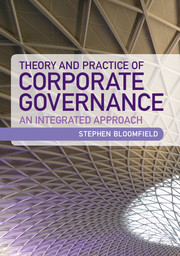Book contents
- Frontmatter
- Contents
- List of Figures and Tables
- Introduction
- Part 1 The Discipline of Governance
- Part 2 The Relationship between Law and Governance
- Part 3 Governance and the Listed Company
- Part 4 Governance and Regulation
- Chapter 9 The company and the stock market
- Chapter 10 Non-shareholder regulation of companies
- Chapter 11 Changes in regulatory structures – the PRA, the FCA and the ICB recommendations
- Chapter 12 Failure – the abiding characteristic of regulation
- Chapter 13 Accounting for profits: the root of information asymmetry
- Chapter 14 Reward and performance
- Part 5 Counter-governance: Failures of governance and corporate failure
- Bibliography
- Index
- References
Chapter 10 - Non-shareholder regulation of companies
from Part 4 - Governance and Regulation
Published online by Cambridge University Press: 05 March 2013
- Frontmatter
- Contents
- List of Figures and Tables
- Introduction
- Part 1 The Discipline of Governance
- Part 2 The Relationship between Law and Governance
- Part 3 Governance and the Listed Company
- Part 4 Governance and Regulation
- Chapter 9 The company and the stock market
- Chapter 10 Non-shareholder regulation of companies
- Chapter 11 Changes in regulatory structures – the PRA, the FCA and the ICB recommendations
- Chapter 12 Failure – the abiding characteristic of regulation
- Chapter 13 Accounting for profits: the root of information asymmetry
- Chapter 14 Reward and performance
- Part 5 Counter-governance: Failures of governance and corporate failure
- Bibliography
- Index
- References
Summary
This chapter will consider:
the regulation of companies in markets – characteristics, structural considerations;
the regulation of markets – characteristics, structural considerations, regulation of the market by the market, international issues;
unregulated markets;
illustrations of the impact of regulation: short-selling, insider dealing, the control of takeovers and mergers.
Introduction
This chapter will move from consideration of issues of governance in companies and of companies to a consideration of issues of regulation and, in particular, of the regulation of certain stock market activities. The previous chapter introduced some of the issues involved, which centred principally around shareholder-orientated controls. It provided a conceptual stepping stone between those aspects of governance where the shareholder – or a set of shareholders – is closely engaged in the activity; and regulation where the shareholder is more often the passive recipient of consequences brought about by some external agent, often a stakeholder.
Regulation is almost exclusively a State-dominated activity – either through direct action or some form of delegated power given to bodies which act on behalf of the consumer or the State, or under the authority of the State. It carries in attenuated form one of the fundamental characteristics of the State (under a Weberian definition) – the monopoly of violence – into the (normally) peaceable realm of commerce. Participants in commercial activities are required to submit to some form of state intervention through the medium of regulation and effectively accept that intervention (and the costs associated – levies, financial solvency obligations, fines and so on) as a part of the price of a licence to trade. If they do not accept, or infringe, these conditions then the State will do them some violence – usually this involves some form of additional cost, such as increased staffing; or some form of physical restitution or, more likely, a fine; possibly even imprisonment.
- Type
- Chapter
- Information
- Theory and Practice of Corporate GovernanceAn Integrated Approach, pp. 230 - 262Publisher: Cambridge University PressPrint publication year: 2013



